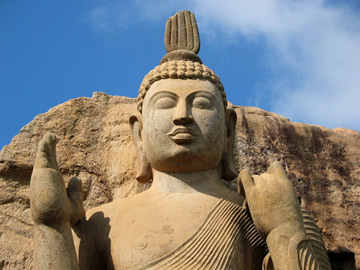Buddhist philosophy’s timeless appeal
 Anyone with a zest for learning philosophy should first study Western
philosophy and then Eastern philosophy because there is a clear
distinction between the two systems. Most Western philosophers tried to
unravel the mysteries of the universe while their eastern counterparts
were more concerned with ethics and spiritual life. This does not mean
that Western philosophers were not interested in spirituality. Aristotle
himself paid attention to human behaviour in his discourses on ethics. Anyone with a zest for learning philosophy should first study Western
philosophy and then Eastern philosophy because there is a clear
distinction between the two systems. Most Western philosophers tried to
unravel the mysteries of the universe while their eastern counterparts
were more concerned with ethics and spiritual life. This does not mean
that Western philosophers were not interested in spirituality. Aristotle
himself paid attention to human behaviour in his discourses on ethics.
When it comes to Eastern philosophy we come across three dominant
figures. Confucius in China took a more active approach than Lao-tzu and
promoted social order based on humanity, custom and personal morality.
As a teacher he tried to produce political stability by cultivating
moral harmony. He began teaching in his twenties or thirties. He was the
first philosopher to devote his whole life to teaching. At 56 he retired
from civil service. For the next 13 years he travelled widely to reform
society. At 58 he returned to Lu, where he continued to teach and write
until his death.
|

The mind is everything. What you think, you become.
-The Buddha |
The next great Eastern philosopher came from India. He was Prince
Siddhartha Gautama who later came to be known as the Buddha. Siddhartha
Gautama (c.563-483 BCE) lived during a period when Western philosophers
such as Pythagoras were examining the cosmos. Prince Siddhartha was born
into a society which paid homage to Brahminism. The Buddha was the first
philosopher to challenge Brahminism. However, he did not claim to be a
saviour, Messiah, prophet or son of God. Before attaining Enlightenment,
he was a prince in a royal family in the present-day Nepal.
Speculation
Unlike Western philosophers, the Buddha was not interested in dealing
with entities beyond human experience. On many occasions he said that
inquiring into the mysteries of the universe was senseless speculation.
Instead he wanted people to question the goal and meaning of life.
Having led a life of luxury he soon realised the futility of mundane
pleasures. Then he sought true happiness for millions of people who
suffered from various illnesses, old age and death.
Having realised that all sensual pleasures were temporary, he
experimented with extreme asceticism by subjecting his body and mind to
rigorous forms of suffering such as remaining without taking food for
days. Then he realised that such a form of austerity brought no tangible
results. Then he gave up practising austerity. Having discarded extreme
forms of living Prince Siddhartha was determined to put an end to human
suffering.
Then it dawned on him that the middle way was the true path to
eternal happiness. To reach a state of permanent happiness he applied
reason and his own life experiences. His attention was drawn to human
sufferings such as illness, old age and death. He said the root cause of
our suffering was the frustration of our own desires. As we are attached
to worldly pleasures it is not possible to put an end to suffering.
Root cause
The next step in his reasoning is that the elimination of attachment
will put an end to suffering. To achieve this state he said we should
get rid of the root cause of suffering i.e. our selfishness. What he
meant was that we should get rid of self- centredness and
self-attachment. In modern psychology this is known as ego.
How can man overcome his attachments when his desires, ambitions and
expectations are an integral part of life? The Buddha said that
suffering results from man’s failure to recognise this baic truth. He
suggested that the only way to end all suffering is to follow the
Eightfold Path that would ultimately put an end to all suffering. The
Eightfold Path is commonly referred to as the Dhamma Wheel which
consists of right mindfulness, right understanding, right speech, right
concentration, right effort, right livelihood, right intention and right
direction.
The Eightfold Path is in effect a powerful code of ethics probably
untouched by Western philosophers. It is the Buddha’s prescription to
lead a happy life. Although man can lead a happy life by following the
Eightfold Path he cannot avoid illness, old age and death. Therefore,
the Buddha had to find a permanent solution. He said such a state can be
achieved only through Enlightenment. In other words, one has to attain
Nibbana which is variously translated as “non-attachment, not being” or
literally “blowing out.”
Nibbana does not mean becoming one with a powerful god. It is an
eternal and unchanging state of “not-being”. It is the ultimate freedom
from all forms of suffering.
Buddhist philosophy spread to China and south east Asia challenging
Confucianism and Daoism. It also spread to Greece in the 3rd century BCE
but it had very little impact. Buddhist philosophical views can be found
in later Western philosophies. However, with the dawn of the 20th
century more and more Western ophilosophers are turning to Buddhist
philosophy for inspiration. |

